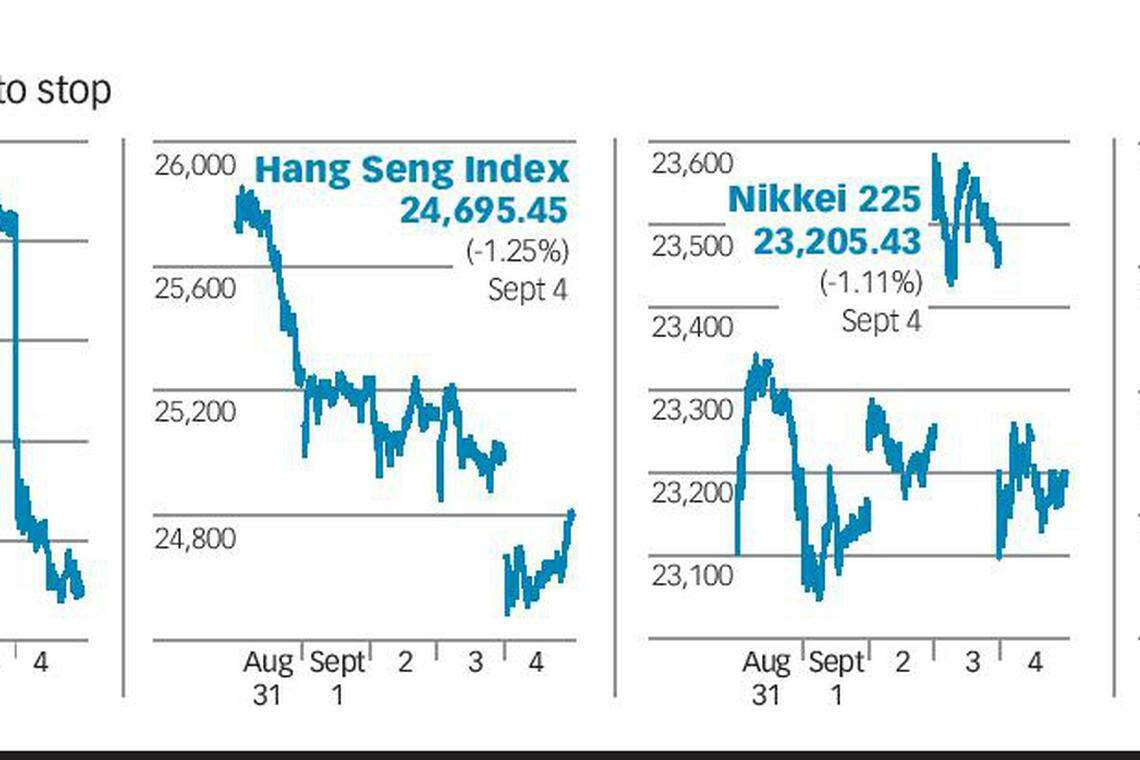Asian bourses trail Wall Street's bloodbath but analysts upbeat
US dip is long overdue correction and led by latest pullback in technology equities, say market strategists

Singapore
ASIAN stock markets woke up on Friday to a Wall Street bloodbath that registered the steepest one-day decline since June. Key indices quickly took the cue from their US counterparts and ended Friday's trading in the red, although some lost ground was recovered by closing time.
But analysts were sanguine that the bull run would continue because the latest pullback in US technology equities - that led Wall Street's meltdown - was long overdue. They see the dips as more of a correction than a sign that the markets have lost steam.
One analyst, however, thought the tech-heavy Nasdaq plunge could be due to market markers' hedging activities.
The Dow Jones Industrial Average, the S&P 500 index and the Nasdaq tumbled by about 2.8 per cent to 5 per cent on Thursday, with major technology stocks including Tesla and Amazon leading the plunge.
Asian markets were not spared on Friday, with Australia's ASX 200 index chalking up the greatest fall in the Asia-Pacific with a drop of 3.06 per cent.
GET BT IN YOUR INBOX DAILY

Start and end each day with the latest news stories and analyses delivered straight to your inbox.
IG market strategist Pan Jingyi told The Business Times that stock prices had been overdue for an adjustment, given the lofty valuations and the overbought situation in the US market - and tech stocks in particular.

US equity markets had rallied since they were pummelled by the virus pandemic in late March, fuelled by monetary and fiscal aid from the state.
Ms Pan believes this dip was an adjustment, and that the uptrend is still intact. She noted that there has been little flight to safety with muted movements in safe haven instruments, US treasuries and gold. This goes to show that it was not a broad-based risk-off reaction.
"That said, the rotation out of the tech leaders may have yet to complete, with further declines not ruled out. One would not want to be caught going against this wave," she advised.
Oanda Asia-Pacific senior market analyst Jeffrey Halley said: "This is not the end of the bull market, although it does have the potential to fall quite a bit further and still be a bull market . . . I note also that the spillover into other asset classes was almost nil, suggesting this is a Wall Street-centric event. Across Asia, stock markets have shown resilience, further reinforcing my comments above."
The magnitude of declines in the Asia-Pacific was smaller than the Wall Street's, with some indices seeing smaller losses by the closing bell.
Hong Kong's Hang Seng index shed 1.25 per cent; South Korea's Kospi index lost 1.15 per cent; Japan's Nikkei 225 was 1.11 per cent lower; while Singapore's Straits Times Index (STI) and the Shanghai Composite Index both slid 0.87 per cent.
Saxo's head of equity strategy Peter Garnry said the sell-off in Nasdaq was driven by dynamics in the options market where market makers likely created a negative feedback loop through their hedging activities.
He added: "Based on estimates of these dynamics, we believe the technical drivers for the sell-off have exhausted themselves and that the market will stabilise here . . . Longer term, we still remain positive on equities as the rebound narrative is intact, supported . . . by better-than-expected initial jobless and continuing claims."
Yeo Kee Yan, equity market strategist at DBS Bank, noted that stock markets continue to face a string of uncertainties, including the evolving global pandemic situation as well as the US elections in November. Observations from past 10 election years suggest that the sell-down could signal a pause in the US equity rally, following the strong run-up in August.
He said: "Despite these near-term headwinds, we think equities will remain in favour amid progressing optimism of Covid-19 vaccine development, signs of broadening recovery and the Fed's (US Federal Reserve's) commitment to keep rates low for longer."
The deepest impact of the global lockdowns has also passed, Mr Yeo noted, adding: "We do not see much downside for the STI (support at 2,440)."
Against this backdrop, he anticipated some rotation out of pandemic "beneficiaries" and the overbought Internet and technology stocks into value and travel-related names.
READ MORE:
KEYWORDS IN THIS ARTICLE
BT is now on Telegram!
For daily updates on weekdays and specially selected content for the weekend. Subscribe to t.me/BizTimes
Capital Markets & Currencies
Asia stocks rise on Wednesday amid Wall Street rally; STI up 0.6%
Brokerage Haitong removes long-term Hong Kong unit chief Lin, appoints new head
Asia: Stocks rise on earnings optimism as US data approaches
Singapore stocks climb at Wednesday’s open; STI up 0.4%
Stocks to watch: MPACT, CapitaLand Ascott Trust, Hotel Properties, OUE Reit, CLCT
Europe: Tech, retail stocks boost Stoxx 600 to one-week high
